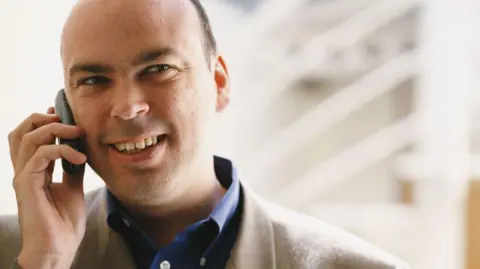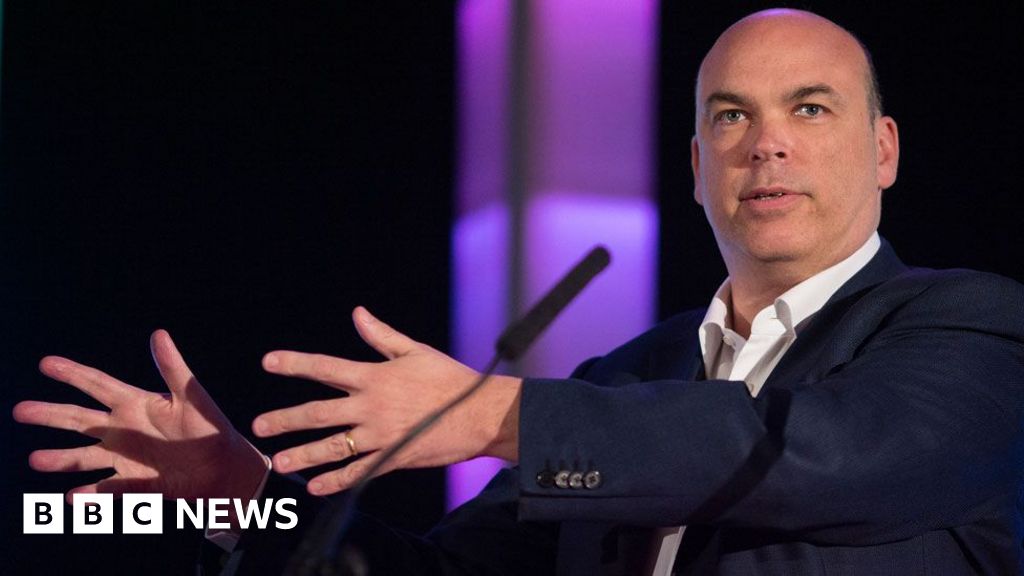 Getty Images
Getty ImagesFriends and colleagues of Mike Lynch have paid tribute to “the UK’s greatest tech entrepreneur” after he was confirmed to have died when a luxury yacht sank off the coast of Sicily.
The British businessman, 59, was among those killed when the Bayesian vessel foundered in stormy weather early on Monday near Porticello.
The bodies of five others have been recovered, and a seventh person – believed to be Mr Lynch’s daughter Hannah, 18, is still missing.
Mr Lynch was a prominent figure in the UK tech industry, where his backing of successful companies led to him being dubbed the British equivalent of Microsoft founder Bill Gates.
However, he later became embroiled in a long-running legal dispute which resulted in him being controversially extradited to the US, before being acquitted earlier this summer.
Andrew Kanter, a close friend and colleague of Mr Lynch, said he was “the most brilliant mind and caring person I have ever known.”
“Over nearly a quarter century I had the privilege of working beside someone unrivalled in their understanding of technology and business,” he said.
Former Sun newspaper editor David Yelland said Mr Lynch was “an irreplaceable loss not only to those that loved him but also to the country”.
“He is the UK’s greatest tech entrepreneur of recent decades, a family man, a long-time client of my business and a friend,” he said.
“To think Mike Lynch lost his life just as he began to rebuild it is devastating for all those that know him.”
Morgan Stanley International bank chairman Jonathan Bloomer, his wife Judy Bloomer, Clifford Chance lawyer Chris Morvillo, his wife Neda Morvillo and Recaldo Thomas, the yacht’s chef, also died when the vessel sank.
In a statement confirming their parents’ deaths, the Bloomer family described the couple as “incredible people and an inspiration to many”.
Mr Lynch is survived by his wife Angela Bacares, who was rescued, along with 14 others, after the yacht sank. The couple lived at the Loudham Hall estate in Suffolk.
Brent Hoberman, co-founder of Lastminute.com, described the deaths as “tragic”, saying Mr Lynch had much more to give to the UK tech scene.
“He was still on his journey, and he’d been sidetracked for a decade with this court case,” he told the BBC.
“I think there was a lot of unfulfilled potential.”
IT analyst Richard Holway said in a post on LinkedIn that Mr Lynch – a friend of more than 25 years – was “a unique British tech talent”.
“Goodness knows what he could have achieved next,” he added.
Business highs and lows
Mr Lynch co-founded tech firm Autonomy in 1996, which expanded rapidly and was sold to Hewlett Packard for $11bn (£8.6bn) in 2011, from which he is believed to have netted £500m.
But questions over the sale of Autonomy led to a long-running legal battle.
In 2022, Mr Lynch lost a civil fraud case against HP at the High Court in London.
A day later, he was extradited to the US as part of criminal proceedings, and was facing a possible two decades in jail.
He was acquitted in June this year after a jury found him not guilty of the crimes.
He told BBC Radio 4 that though he was convinced of his innocence, he was only able to prove it in a US court because he was rich enough to pay the enormous legal fees involved.
Mr Lynch is reported to have gone on the yacht trip with his family to celebrate securing his freedom.
Its name, Bayesian, is understood to derive from the theory that his PhD thesis – and the software that underpinned Autonomy – was based on.
Witnesses say its aluminium mast broke in half in a storm, causing the ship to lose its balance and sink.
Dick Smith, a neighbour of Mr Lynch, told the BBC he was “reeling from the shock of the news”.
“He was so approachable and a very easy person to talk to with a nice sense of humour,” he said.
“You might think with all that money he would be difficult to talk to, but in fact he was a very easy person to talk to.”
Solder in the carpet
Born on 16 June 1965, Mr Lynch was the son of a nurse and a fireman, and was raised near Chelmsford in Essex.
His first computer was a BBC Micro, and he wrote fondly of how it shaped his passion for programming in a 2011 BBC article celebrating 30 years of the device.
While at school his “first foray into commercialisation of technology” came when designing a digital sampler that could sample music, then selling the designs, according to a 2017 interview.
He continued the hobby while studying Natural Sciences at the University of Cambridge – where he said he annoyed his college by getting “solder in the carpets” of his room.
While at Cambridge he earned a PhD in mathematical computing, and later undertook a research fellowship.
In 1991, Mr Lynch helped establish Cambridge Neurodynamics – a firm which specialised in using computer-based detection and recognition of fingerprints.
His tech firm Autonomy was created five years later, using a statistical method known as “Bayesian inference” at the core of its software.
The company’s fast-paced growth and success throughout the late 1990s and early 2000s saw Mr Lynch earn a number of awards and accolades.
In 2006 he was awarded an OBE in recognition of his service to UK enterprise.
He served on the board of the BBC as a non-executive director, and in 2011 was appointed to the government’s council for science and technology – advising then-Prime Minister David Cameron on the risks and possibilities of AI development.
Following the sale of Autonomy, Mr Lynch established tech firm Invoke Capital, which helped create prominent UK cybersecurity firm Darktrace in 2013. Lynch had a seat on its board until earlier this year.
Reacting to the news on Thursday, a spokesperson for Darktrace said that they were shocked by the tragedy, describing Mr Lynch as an “active champion” of the UK’s technology sector.
“His loss will be felt by many,” they added.

